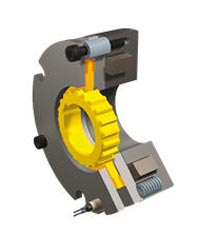Spring applied safety brake for servomotors

The spring applied ROBA-servostop safety brake permits ten times the load-mass ratio in comparison to permanent magnetic brakes. <br>
The spring applied “ROBA-servostop” safety brake works according to the so-called “fail-safe” principle, and therefore provides maximum safety even in the event of a power failure or emergency stop. As a result, it is predestined for application in the gravity loaded axes of machine tools, handling gantries or assembly equipment.
Normally, servomotors are fitted with PMBs, which are relatively cost-effective and provide performance density. However, this cost advantage is diminishing, due to the fact that magnetic materials have become extremely expensive. The drive specialist therefore now sees a positive opportunity for the safety brake. It is less sensitive than the PMB, given that permanent magnets can lose magnetic force when subjected to the often extremely high temperatures of up to 120°C in today's motors, which can then lead to a drop in braking torques.
When the spring applied safety brake is closed, the rotor with the friction linings is held between the armature disk and the brake plate. If the installed magnetic coil is energized, then the magnetic field pulls the armature disk against the force of the springs to the coil carrier, thus releasing the brake. The servobrake works safely and reliably thanks to this fail-safe principle.
The ROBA-servostop permits ten times the load-mass ratio: Normally an order of magnitude of 3:1 or smaller is selected for servodrives for favourable regulation characteristics and high dynamic load-mass ratios from load to motor. The ROBA-servostop permits load-mass ratios of 30:1 and more thanks to its high permitted friction work and friction powers. Whilst permanent magnetic brakes tend to cause a sharp rise in braking torques under such conditions, use of the ROBA-servostop avoids any damage to the drive line.
The high performance capability and low wear, as well as the simple installation, are further advantages of the ROBA-servostop, which can be integrated into the B bearing side of the motor without any restrictions.
Contact:
Chr. Mayr GmbH + Co. KG, Eichenstraße 1, 87665 Mauerstetten, Dipl.-Ing. (FH) Hermann Bestle
Tel.: 08341/804-232, Fax: 08341/804-49232
E-Mail: hermann.bestle@mayr.de, Web: http://www.mayr.com
Media Contact
More Information:
http://www.mayr.comAll latest news from the category: Machine Engineering
Machine engineering is one of Germany’s key industries. The importance of this segment has led to the creation of new university degree programs in fields such as production and logistics, process engineering, vehicle/automotive engineering, production engineering and aerospace engineering among others.
innovations-report offers informative reports and articles covering technologies such as automation, motion, power train, energy, conveyor, plastics, lightweight construction, logistics/warehousing, measurement systems, machine tools and control engineering.
Newest articles

Innovative 3D printed scaffolds offer new hope for bone healing
Researchers at the Institute for Bioengineering of Catalonia have developed novel 3D printed PLA-CaP scaffolds that promote blood vessel formation, ensuring better healing and regeneration of bone tissue. Bone is…

The surprising role of gut infection in Alzheimer’s disease
ASU- and Banner Alzheimer’s Institute-led study implicates link between a common virus and the disease, which travels from the gut to the brain and may be a target for antiviral…

Molecular gardening: New enzymes discovered for protein modification pruning
How deubiquitinases USP53 and USP54 cleave long polyubiquitin chains and how the former is linked to liver disease in children. Deubiquitinases (DUBs) are enzymes used by cells to trim protein…



